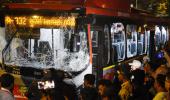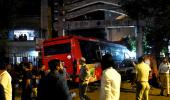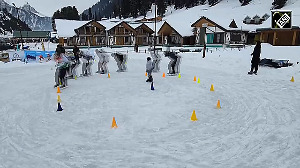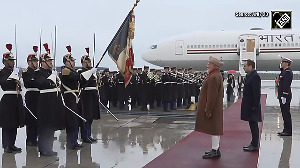The Mumbai Regional Transport Office (RTO) officials have said they suspect 'human error' and 'lack of proper training' led to the horrific accident in Kurla where a Brihanmumbai Electric Supply and Transport (BEST) bus fatally knocked down seven persons and injured 42 others.

Soon after the incident on Monday night, an investigation team of the Wadala RTO found that brakes of the Olectra-make electric bus were operating well.
The e-bus operated by the civic-run BEST undertaking rammed into pedestrians and vehicles at around 9.30 pm on Monday on the S G Barve Marg in Kurla (West).
Sanjay More, 54, who was at the wheel of the ill-fated bus, was later arrested.
Initially, it was suspected that brake failure could be the cause of the accident.
Driver More's family also claimed brake failure could have led to the incident and that he did not consume alcohol.
A team of the Wadala RTO led by motor vehicle inspector Bharat Jadhav completed the inspection of the bus at the BEST's Kurla depot on Tuesday morning.
An official, who did not wish to be named, told PTI that when the RTO team inspected the bus, it found its brakes were working fine.
However, before submitting the probe report, they want to investigate a few more things, and hence they have sought some details from both Olectra and BEST.
The official said it seems the driver was inexperienced to handle the automatic transmission bus with no clutch and gear like conventional buses, and he was probably not given proper training before being permitted to drive the 12-meter-long vehicle.
"If a driver doesn't have experience driving an automatic transmission bus, he doesn't get proper judgement of acceleration and braking initially. Hence, it seems human error may have caused the accident," he said.
During RTO's inspection of the accident-struck bus, the brakes and all other systems, including its headlights, were found to be operating fine, the official added.
The electric bus was just three months old as it was registered in the name of EVEY TRANS on August 20.
The driver was supplied through a Pune-based third-party agency, as per RTO sources.
The inspection team checked all three CCTV cameras installed inside the bus, and their footage suggested 'the entire horror unfolded within a span of 52 to 55 seconds', an official said.
As per BEST's records, the driver signed on duty at around 2.45 pm on Monday, and the accident occurred at 9.35 pm.
The e-bus covered a distance of 400 to 450 meters since it dashed the first vehicle and finally crashed into the compound wall of a housing society on S G Barve Road while heading to Sakinaka from Kurla station, the RTO officials said.
They also suspect the driver might have panicked after the bus rammed into the first vehicle, and probably increased the speed due to which it hit everything on the way before crashing into the society wall.
As per the records, the driver joined duty on November 29, 2024, and was given the electric bus to drive from December 1.
The BEST administration and the driver's family have made contradictory statements about his training.
Speaking to the reporters, BEST General Manager Anil Diggikar claimed Sanjay More was given three days of induction training, while the latter's son Deep More claimed his father underwent 9 to 10 days of training before he was given the electric bus to drive.
As per the BEST records, More was driving the wet leased 7 to 9-meter Tempo Traveller mini buses in their fleet since November 2020, but had no experience driving a 12-metre electric bus as he earlier worked for M P Group, before joining Daga Group that recently withdrew its around 280 mini buses from BEST's operation.
A retired RTO official said the automatic transmission electric buses and manual transmission fossil fuel buses have different mechanisms. Hence, it takes some time to get used to driving them.
"It is a human error probably caused by lack of knowledge," he said.
The driver, perhaps, did not have proper knowledge as automatic transmission electric buses do not have air-assisted braking systems, he added.
Maharashtra Transport Commissioner Vivek Bhimanwar on Tuesday said the RTO team has investigated the bus, but the report from Olectra's engineers is still awaited.
"Our team has investigated the bus as per the set Standard Operating Procedures (SOP) for inspecting the bus," he said, adding they will submit their report to the Mumbai police.











 © 2025
© 2025